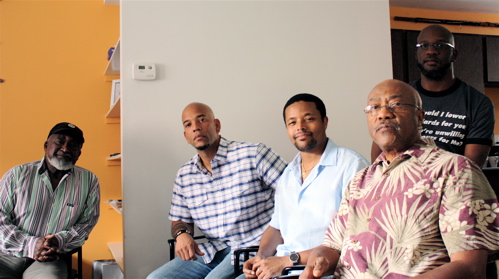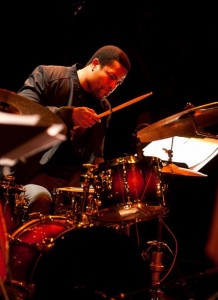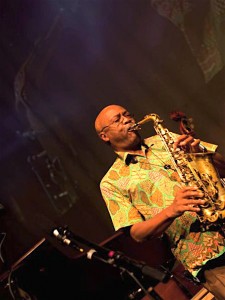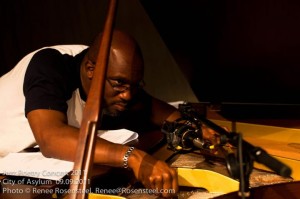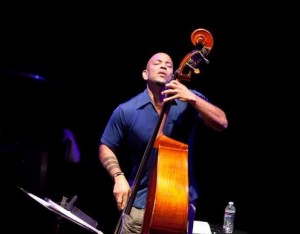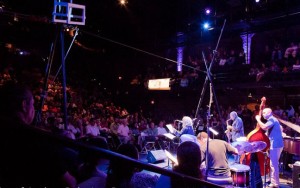Tarbaby Trio and Oliver Lake: Naked on Stage
by Joshua Barnes / November 14, 2011 / No comments
The poets who read at City of Asylum Pittsburgh’s 2011 Jazz/Poetry concert were backed by the jazz trio known as Tarbaby—a tight, partially improvisational group made up of Nasheet Waits (drums), Orrin Evans (piano), Eric Revis (bass). With them was alto saxophonist Oliver Lake, who has performed in COA/P’s annual Jazz Poetry festival for seven consecutive years.
Before the concert, the musicians congregated in the Oliver Lake Jazz House (a City of Asylum house painted by Lake) for an interview with the Pittsburgh artist and life-long music lover, Thaddeus Mosley. Now 85, Mosley has been listening to jazz since he was eight years old. One of his first memories of the music was seeing Blanche Calloway perform at Cascade Park in the mid 1930s. Two years later Mosley saw a performance from Chick Web and an eighteen-year-old Ella Fitzgerald, who he remembers “was a sort of thinned, raw-boned young woman.”
In this interview, the group discusses the meaning behind the name Tarbaby, how they ended up working with Oliver Lake, and their thoughts on performance (one should be naked up there), while mentioning a veritable catalog of influential jazz musicians, plus their favorite musicians from Pittsburgh.
Thaddeus Mosley: How did you get the name of the band, Tarbaby? It has connotations that might provoke something publicly…
Nasheet Waits: I think there are a lot of meanings to the word Tarbaby. Our reason for using the word as a moniker for our band was centered around the type of music that we are attracted to and how we use that as a vehicle for expression. When we picked the name we were seeing a movement away from expression towards the technical. Pyrotechnics were being used to emphasize the player’s virtuosity as opposed to the feeling of the music.
Tarbaby is a metaphor that represents how we feel about music and what was happening within a community of musicians in our age bracket. Everything was sort of complicated and difficult for difficulty’s sake and you weren’t necessarily getting anything from the music when you went to hear it. We were like, “This is almost like going to a calculus lecture or something like that. Who goes to a calculus lecture and receives some enjoyment from that?”
It was a very parochial view that was coming across. We wanted to broaden that view and Tarbaby is one of the platforms that we are using to express that.
Thaddeus Mosley: Are you saying the music was based more in aesthetics than in a social context, or a combination of both?
Nasheet Waits: There is always a social component with everything—that’s a part of it—but it was mostly an aesthetic commentary.
Eric Revis: Also, with the emphasis on music being less visceral and more geared toward intellect—it’s not that we try to over-accentuate that disparity— but we realized that we had became pariahs in our age bracket, in our community, and nobody really wanted to touch us. ‘Cause man, we all have stories of being hired by people…
Nasheet Waits: And then fired. (Laughter)
Thaddeus Mosley: So much of the music that was around wasn’t really expressing what was coming out of your social and educational background, and out of the Afro American experience as you knew it?
Nasheet Waits: Whatever your experience is, I would think that you would want the music to reflect that. I don’t know if much of the music was serving as a reflection in most instances.
Eric Revis: Or is….
Nasheet Waits: Or is. I think a lot of things have been achieved through “jazz education,” but people look at it like it’s a process as opposed to it being an extension of what you are. Personally speaking, I felt separate from that. It’s not something outside of you; it’s a part of you.
Thaddeus Mosley: Well then, how did you guys hook up with Oliver? Oliver is from the school where people learn mainly by playing. In the old days, most guys learned by playing with older guys and playing in clubs. There were a lot of clubs, particularly in Chicago’s South Side, or Pittsburgh’s Hill District, and the young guys camped down there, listening and sitting in and so forth. I don’t know if that situation exists much now…
Nasheet Waits: My father was Freddie Waits, the drummer. He and Oliver had worked together previously. I remember listening to—I think one of the last recordings that my father did was with Mr. Lake and a trio he was a part of called Trio Transition, with Reggie Workman on bass and Mulgrew Miller on piano—
Thaddeus Mosley: He’s one of my favorites. I remember Miller was one of the Memphis school of Phineas Newborn, Harold Mabern, James Williams, and all of those guys.
Nasheet Waits: They ended up recording, and augmented the group with Mr. Lake. I had been listening to that record a lot two years ago as we were getting ready to do a recording. I thought, “It would be great if we could get Oliver Lake, if he would be kind enough to bless us with his presence.” I told Eric and Orrin and they were like, “Yeah, that sounds like a great idea, if he’s available and willing to join us.” And so, we’re here and he has been available and willing to join us on a lot of other projects, and brought us in to accompany him on this one.
Oliver Lake: One of the things about that recording: When Nasheet asked me to do one of my original pieces, a piece called “November ’80,” it was the same piece that I recorded with his father. I hadn’t played it in years, so it was great to play it with a younger set of musicians and have that experience again.
Thaddeus Mosley: When people ask musicians who they are influenced by, you need an encyclopedia or computer to take it all in. I know there are also lots of times where there are influences that you can’t define… Who, or what influences you?
Oliver Lake: Two of my main influences are Eric Dolphy and Jackie McLean on the alto saxophone. There are a lot more, but those two stand out.
Orrin Evans: It’s more of a certain time that influences me, what is going on in that year, or couple of years, and the people I’ve met. Growing up in Philadelphia there was no doubt that I was going to be touched by people like Shirley Scott, Trudy Pitts, Eddie Green, and Sid Simmons—all piano players. Once I moved to New York I got the pleasure of hanging around and getting to know Ronnie Matthews and John Hicks.
It’s like you said, it could be like an encyclopedia. All of those different people in my head remind me of a time. Even here, in Pittsburgh, there’s Roger Humphries.
Eric Revis: For me it’s Jimmy Blanton, Wilbur Ware, and Paul Chambers. That line also extends through Peter Colbalt, and Gary B. Haughton, circa 1964. There are so many, I steal from basically everybody.
Nasheet Waits: First and foremost my father, Freddie Waits. Other people who were very influential: Max Roach was like a godfather to me; Patrick Fred King was a wonderful percussionist and a member of a percussion group called M’Boom. I could go on and on. Billy Higgins, Art Blakey; I had the opportunity to see them because my father had a relationship with these people, I was given a pass in a certain way and it really influenced me a lot.
Thaddeus Mosley: What Pittsburgh musicians do you enjoy playing with or being associated with?
Oliver Lake: Well, I did a tour with Dwayne Dolphin and Geri Allen’s group as early as last year. Before that, I played with him and with Roger Humphries in one of the first concerts that we did for Jazz/Poetry, here in Pittsburgh. They would be my two favorite Pittsburgh musicians.
Orrin Evans: Roger is like an uncle to me and has been real close with my wife’s family for years. I remember almost ten years ago, before Tarbaby, when we were Orrin, Nasheet, and Eric, and we came to Pittsburgh to do a gig. Roger came out and sat in and I’ll never forget that moment.
Nasheet Waits: That was a lesson…
Eric Revis: Never forget…
Orrin Evans: I remember because Nicholas Payton was there and Bobby Watson too, and all of us were just standing there and looking like, “Phew.” Dwayne [Dolphin] is like a big brother to me, but there’s also a lot of great pianists here: Howie Alexander is one of them.
Eric Revis: For me, those mentioned, plus Jeff “Tain” Watts. He is my brother and we were in Branford Marsalis’ band for a number of years together. He has been very influential to me.
Oliver Lake: Jeff was also on that same tour with Dwayne, Geri Allen, and myself last year.
Thaddeus Mosley: When you’re performing, people can have so many preconceived notions of what you should be playing, rather than listening to what you’re really playing. There are probably some nuances in your performance that even people who consider themselves aficionados should be alerted to hear. What are some things that you think people should know about and look for in your music?
Oliver Lake: I think that this group brings a lot of surprises; there’s a lot of improvisation. There are a lot of things that surprise us once we get on stage and that is the excitement that the group brings—we don’t know what’s going to happen! We bring our experiences and then we share that with the audience. Of course, the compositions that Eric and the other band members have written are brilliant, but I think the main emphasis goes back to what Nasheet was saying earlier, that it’s more about emotion and exposing and sharing our energy with the audience.
Nasheet Waits: We’re looking for an inter-active type of experience as opposed to, “We’re here and you’re there.” It’s more like a community.
Eric Revis: There is also a certain vulnerability to it. I feel very blessed and confident with these individuals. I can be myself and there is nothing wrong. It opens up an avenue where you can be as vulnerable an individual as possible. Collectively, we express that pretty well.
Nasheet Waits: On stage you’re supposed to be naked. Even if you’re wearing a three-piece suit you’re supposed to be naked. So we’re up there trying to be….
Eric Revis: Naked! (Laughter)
Thaddeus Mosley: Go naked unto the world.
I remember Ornette Coleman came to Pittsburgh in ‘59. I had bought a couple of his records, but many people had no idea what Ornette played. They just said, “Man, that’s supposed to be jazz!” In any kind of art people have an idea about what something is supposed to be. If this is Campbell’s soup, they know what that tastes like. If you say, “I’ve made a soup,” they say, “This doesn’t taste like Campbell’s!”
Thaddeus Mosley: I imagine that in your experiences you have probably run into that idea.
Orrin Evans: The key thing is that it’s all soup. It might not be Campbell’s, but it’s still soup. I like what Nasheet said about being naked. Even the audience is naked at a certain point; you leave those preconceived notions and come to be blessed or touched by the music or the experience or whatever it is.
Thaddeus Mosley: In other words, you gentlemen don´t play it safe?
Eric Revis: That is one thing that you can count on.
Nasheet Waits: It’s risky.
Thaddeus Mosley: Our ears will be at risk. Thank you gentlemen.

